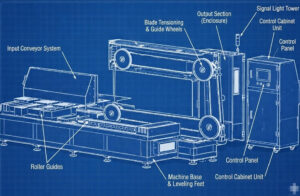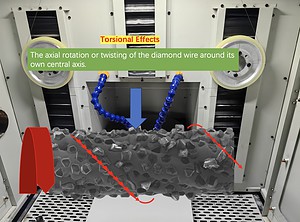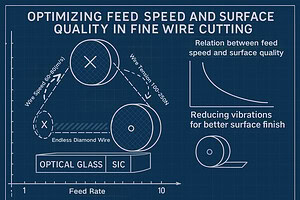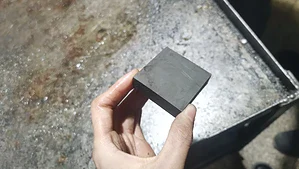Introduction
In high-precision industries, the demand for ultra-fine and damage-free material processing continues to rise. From optical lenses to semiconductor wafers and technical ceramics, the pursuit of precision is a key driver of manufacturing innovation. Among the most advanced solutions is the precision diamond wire cutting system, a technology engineered to deliver outstanding accuracy, low kerf loss, and superior surface quality across a wide range of hard and brittle materials.
1. What Is a Precision Diamond Wire Cutting System?
This system uses a closed-loop diamond wire that rotates at high speed to cut through materials with minimal mechanical stress. Unlike traditional saw blades or reciprocating wires, the endless diamond wire offers continuous, non-reversing motion, reducing vibration and heat buildup.
Key components include:
- Diamond-coated loop wire, ensuring smooth, low-damage cutting
- Servo-driven feed mechanisms for precise movement
- Automatic tensioning system to maintain optimal wire tension
- Optional rotary/tilt axes for complex-angle cutting
This advanced configuration enables precise slicing of ultra-hard materials while maintaining dimensional integrity.
2. Achieving Ultra-Fine Accuracy: ±0.01mm Positioning, ±0.03mm Cutting Tolerance
The precision diamond wire cutting system excels by combining ±0.01mm positioning accuracy with ±0.03mm cutting tolerance. These figures are critical when handling materials that cannot tolerate microfractures or dimensional deviation.
Achieving this level of precision depends on:
- CNC-controlled axis movement with servo drive systems
- Real-time wire tension regulation using pneumatic or servo systems
- Low-vibration mechanical design, eliminating motion drift during long cuts
Such tight tolerances are particularly valued in optics, electronics, and aerospace manufacturing, where performance depends on surface integrity and exact dimensions.
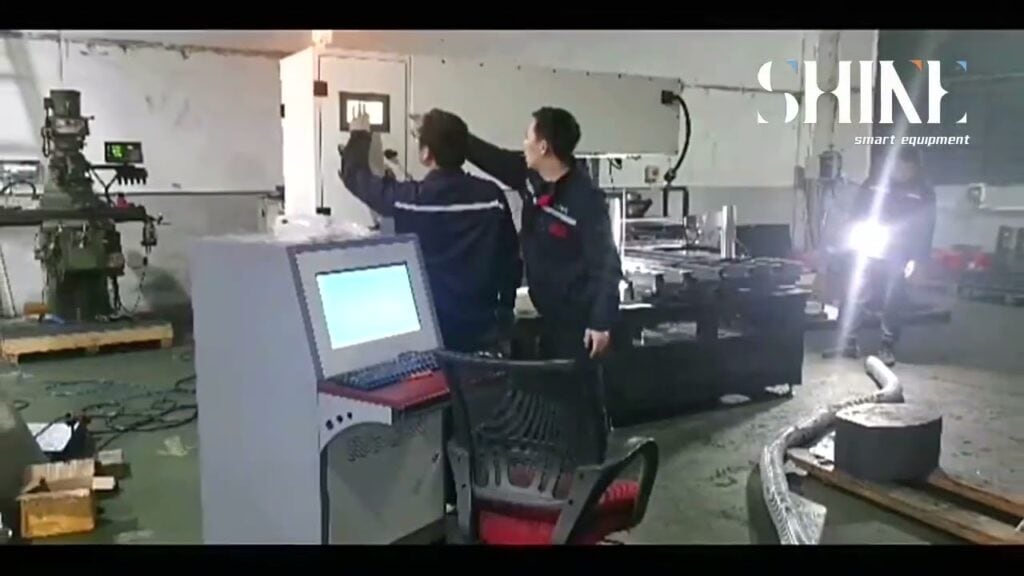
3. Supported Materials and Applications
This cutting system supports a wide range of brittle and high-value materials, including:
- Sapphire, silicon carbide, and quartz
- Optical glass and fused silica
- Alumina ceramics
- High-purity graphite
- Multilayer composites and precious crystals
Its ability to cut thin slices (as low as 0.1 mm) and large formats (up to 400 mm thickness or more) makes it ideal for both R&D and production environments.
Typical applications span:
- LED substrate preparation
- Semiconductor wafering
- Precision lens blank slicing
- Aerospace ceramic component prototyping
4. Compared to Traditional Cutting Systems
| Aspect | Traditional Saws | Diamond Wire Cutting System |
|---|---|---|
| Positioning Accuracy | ±0.05–0.1 mm | ±0.01 mm |
| Cutting Tolerance | ±0.1 mm or more | ±0.03 mm |
| Kerf Width | ≥1 mm | 0.35–0.65 mm |
| Surface Finish | Requires heavy post-processing | Minimal polishing required |
| Material Damage | Cracks, heat zones | Low-stress, chip-free |
| Complexity of Cut | Mostly straight cuts | Supports irregular profiles |
Traditional saws often introduce heat, vibration, and material loss. In contrast, the diamond wire cutting system offers smoother edges, smaller kerf, and cleaner surfaces—key advantages for critical components.
5. Intelligent Automation and Process Control
Modern systems feature extensive automation and real-time process monitoring, including:
- Touchscreen control panels for parameter adjustment
- Programmable multi-step slicing cycles
- Wire speed adjustment up to 80 m/s
- Wire break detection and auto-stop
- Compatibility with dry or wet cutting
Advanced models support 4-axis control (X/Y/Z + rotation) for cutting complex geometries without manual repositioning.
6. Real-World Benefits and Industry Use
Industrial users in semiconductors, photonics, aerospace, and advanced research report major benefits:
- Material conservation through narrow kerf widths
- Improved yield thanks to reduced surface damage
- Simplified post-processing, lowering total production time
- Extended wire life under stable tension conditions
Whether used for small lab samples or full-scale wafer slicing, the system delivers consistent and repeatable results across shifts.

Conclusion
With its blend of ±0.01mm positioning precision, ±0.03mm cutting tolerance, and automated multi-material capability, the precision diamond wire cutting system sets a new benchmark for high-end manufacturing. It supports ultra-fine material processing while reducing operational costs and post-processing steps—making it a cornerstone technology for industries demanding the very best in cutting performance.

